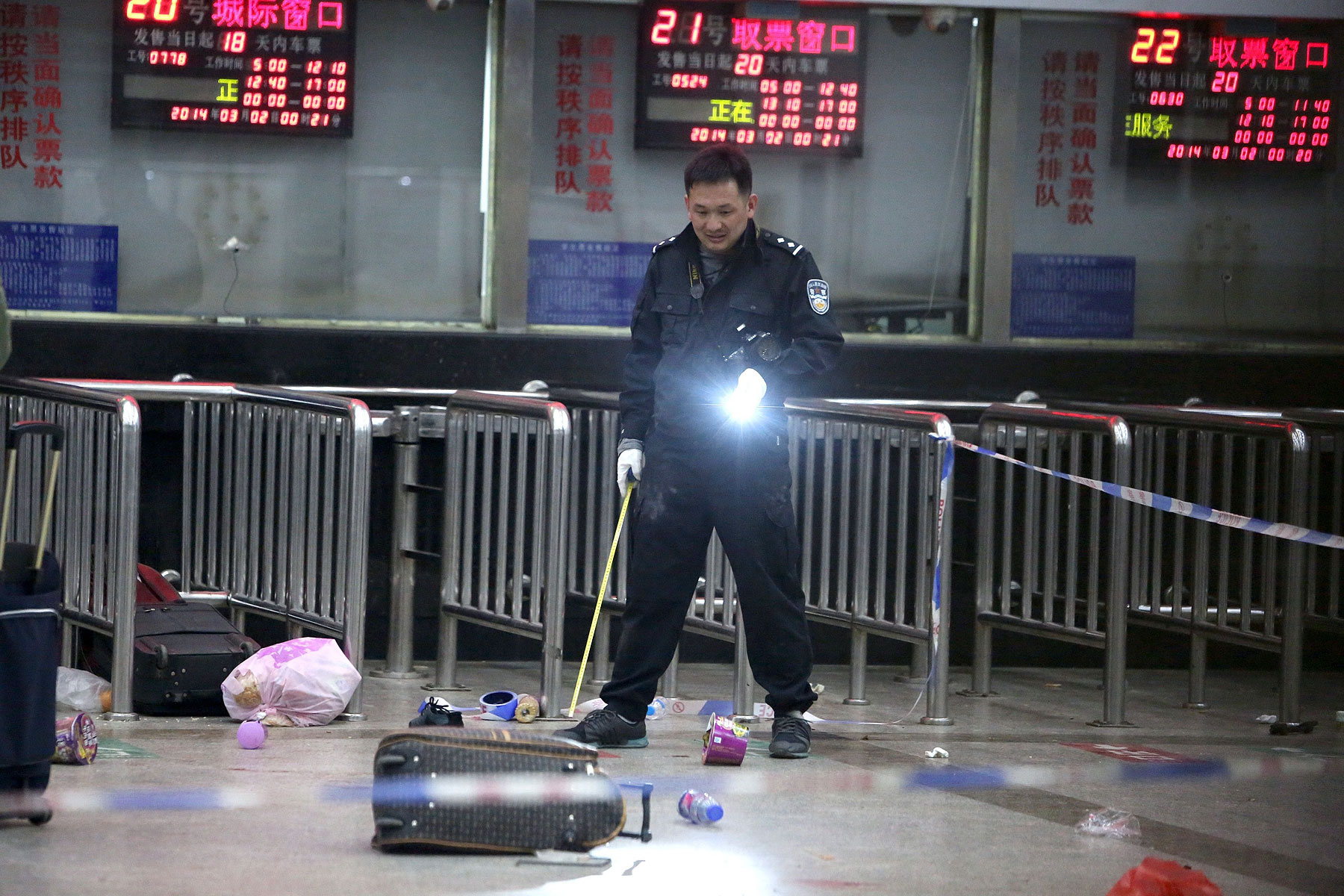
A quick Chinese lesson: Xinjiang, the oil-rich northwestern region that is home to the Uighur minority, literally means “new frontier.” One way to parse the name of Kangding, a city in the foothills of the Tibetan plateau, is from an ancient Tibetan land (Kham) and a word that can mean “to stabilize.” Nanning and Xining, the capitals of two other far-flung places inhabited by ethnic groups, translate as “peaceful south” and “peaceful west,” respectively, reflecting Chinese imperial hopes that their old borderlands remain free of conflict. China’s complicated—and often contentious—relationship with its ethnic minorities is transcribed in its very place names.
On March 1, just four days before members of China’s docile legislature gathered in Beijing for their annual conclave, terror struck the southwestern city of Kunming, where black-clad assailants slashed 29 people to death at a train station and injured scores of others. The murderous rampage, blamed by the Chinese government on Muslim “separatists from Xinjiang” intent on jihad, shocked a nation not used to such eruptions of terrorism. Ancient worries about the nation’s ethnic cohesion were awakened. More than 90% of Chinese come from the Han ethnic majority. But two ethnic groups—the Turkic-speaking Uighurs and the Tibetans—keep challenging the notion that the People’s Republic is one big happy family.
About 125 Tibetans have immolated themselves since 2011 to protest state repression, while clashes in Xinjiang in recent months have claimed dozens of lives, both Uighur and Han. Memories of race riots in Tibet (2008) and Xinjiang (2009) still linger. Ethnic dissent is all the more threatening because these minorities’ native lands contain much of China’s natural-resource bounty. Public avowals of discontent are proliferating among all strata of Chinese society, as citizens demand something beyond economic betterment. But the unhappiness of the Tibetans and Uighurs is more existential. And more disquieting.
China’s leaders have a lot on their hands. Confronting a slowing economy, they must sate a populace that has come to expect ever rising standards of living. They must combat endemic corruption in the ruling Communist Party and manage China’s worsening relations with its neighbors. They must contend with public calls to clean up the environment and pay more than lip service to rule of law. Each of these policy dilemmas requires deft decisionmaking by President Xi Jinping and Premier Li Keqiang. Now add the specter of ethnic unrest, simmering for years, to Beijing’s daunting to-do list.
Li’s 34-page blueprint for the coming year, delivered in exhaustive detail at the start of the National People’s Congress, addressed the ethnic issue in three paragraphs—less airtime than given to the development of China’s R&D. The Premier started off by lauding “all of the ethnic groups in the big family of the Chinese nation.” Although he acknowledged that China needed to “uphold and improve the system of regional ethnic autonomy” and protect the cultural traditions of ethnic groups, he focused on development as the panacea for all ills. But like many other citizens, Uighurs and Tibetans will not be appeased only by material benefits. Living standards have, indeed, improved in ethnic areas. Yet concerns remain about the freedom to worship and secure the same kind of jobs as Han migrants.
Just as with Muslims in the West, Uighurs will now have to deal with even more suspicion. Yes, some Chinese intellectuals and opinion makers have warned against bigotry. But Uighurs (and Tibetans to a lesser degree) already struggle with commonplace tasks: finding a hotel room in a strange city, say, or strolling through a public space without inviting police scrutiny. Life is only going to get more troublesome. “Because of Kunming, China will enhance and intensify its crackdown on separatism and terrorism,” says security expert Gao Feng. “We need stability. That is the most important lesson.”
Repression, though, has a habit of begetting more rebellion. The exact motivations of the six men and two women believed to have unleashed the terrorist attack aren’t fully clear. The authorities say all have been either killed or caught. Yet few will be surprised if ethnic violence continues. The men who long ago named China’s borderlands envisioned peace. But calm isn’t gracing the nation’s restive ethnic frontiers.
More Must-Reads from TIME
- Why Trump’s Message Worked on Latino Men
- What Trump’s Win Could Mean for Housing
- The 100 Must-Read Books of 2024
- Sleep Doctors Share the 1 Tip That’s Changed Their Lives
- Column: Let’s Bring Back Romance
- What It’s Like to Have Long COVID As a Kid
- FX’s Say Nothing Is the Must-Watch Political Thriller of 2024
- Merle Bombardieri Is Helping People Make the Baby Decision
Contact us at letters@time.com